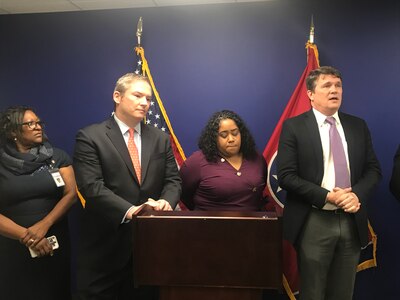Gov. Bill Lee’s pledge to help low-income students in districts with failing schools is falling flat on some ears in Tennessee, where two of his signature proposals could instead end up benefiting middle-class families and changing the landscape of school systems that are doing just fine.
In his State of the State address earlier this month, the new Republican governor told the legislature that “low-income students deserve the same opportunities as other kids.” He unveiled two initiatives aimed at giving parents more education choices for their children, in accordance with a frequent promise on the campaign trail.
“We need a bold plan that will help level the playing field,” Lee told legislators.
One of his proposals would create a new type of voucher program that gives taxpayer money to some families to pay for private education services for children who are pulled from public schools or starting kindergarten.
But the way the legislation is written, the program could provide an average of $7,300 annually to a family of three who makes up to about $77,000, or a family of four who makes up to about $93,000 — double the annual income under federal eligibility requirements for receiving free and reduced-price lunches.
The other proposal would create a new state commission to hear appeals from organizations whose applications to open charter schools were denied by local school boards.
But the legislation also would empower the new entity to open a new charter school in any Tennessee district that refuses to comply if its local decision to deny an application is overturned. That’s different from current state law that restricts the Tennessee Board of Education, which is the state’s current appellate authorizer, to opening new charter schools only in districts with schools in Tennessee’s bottom 5 percent.
Fast tracking legislation
Both the voucher and charter bills were approved by key legislative committees this week, prompting Lee to again call for help for “low-income students.”
“With the legislature’s hard work, school choice has momentum, and we are working together to put students first and strengthen our public education system,” the governor said in a statement issued after the votes.
Others question that.
“I want to take Gov. Lee at his word that he wants to help low-income students who are attending underperforming school,” said Sen. Jeff Yarbro of Nashville, who chairs the legislature’s outnumbered Democratic caucus.

“But any rigorous analysis of this legislation, and any genuine consultation with the schools affected, would conclude that the people he says he’s helping would, in fact, be harmed.”
Democratic leaders blasted Lee’s administration on Thursday for his voucher bill that they say is intended to help families that already plan to homeschool or send their kids to private or parochial schools.
“The governor needs to do more homework on vouchers,” Yarbro told reporters. “Whenever vouchers have passed in states like Indiana or Wisconsin, they say it’s to help poor kids in failing schools. But when you look at the reality, most vouchers across the country end up going to higher-income families who never had plans to go to public schools in the first place. And this bill goes out of its way to make upper-income families eligible for vouchers.”
Veering on vouchers
Lee’s proposed program would put an average of $7,300 in education savings accounts for students in districts with three or more low-performing schools, which currently would affect five communities. His advisers say families with low incomes would get priority over more affluent applicants, and the governor drove that point home in his State of the State address.
“ESAs will enable low-income students from the most underperforming schools to attend an independent school of their choice at no cost to their family,” Lee told lawmakers.
"ESAs will enable low-income students from the most underperforming schools to attend an independent school of their choice at no cost to their family."
Gov. Bill Lee, State of the State
But the legislation also allows private schools to charge full tuition to those students. In cities like Memphis or Nashville, the price tag for a private education is typically at least twice the amount that the state would offer to participating families.
“If you’re living paycheck to paycheck, a voucher that lowers the cost from $16,000 to $9,000 is worthless,” Yarbro said. “The cost might as well be $9 million.”
A spokeswoman for Lee did not immediately respond when asked whether his proposal could end up bypassing low-income families. But Rep. Bill Dunn, who is carrying the education savings account legislation for the governor, said nothing prevents private schools from providing scholarships or students from participating in work-study programs to offset the full cost of tuition.
The larger intent, he said, is that the program would give students an opportunity to get an education that is better tailored to their needs.
“This isn’t a welfare program,” the Knoxville Republican said. “This is a program to allow families and students to figure out how best do we get the most out of our educational experience.”
Stepping up charters
Lee said the intent of his charter school proposal is to open more high-quality charters and close lower-quality ones. In making his case, he frequently cites a young man he mentored who was profoundly and positively affected by a charter school education.
Rep. Mark White, the Memphis Republican who is shepherding the governor’s legislation, said the bill essentially would transfer to a new commission the same appellate power now given to the State Board of Education.
The measure has the support of the state’s charter sector.
“We believe that establishing a high-quality independent statewide appellate authorizer, founded on best practices, will ensure that decisions to open charter schools in Tennessee are based on what is best for students, not politics,” said Maya Bugg, CEO of Tennessee Charter School Center, a nonprofit group that seeks to develop and support high-performing charters.
Not so, said Rep. Mike Stewart, a Democrat from Nashville, where the local school board has fought charter growth tooth and nail.
“The State Board of Education has not — to the great disappointment of charter zones — just rubber-stamped every appeal,” Stewart said of three out of 21 appeals overturned since 2014. “So now the administration plans to create a pro-charter board designed to proliferate charters in every county in this state, and that’s the point of the charter bill.”

Rep. Jason Hodges, a Democrat from Clarksville, worries that charter schools — which are publicly funded but independently operated schools — could be introduced to his community and would start to drain funds from Clarksville-Montgomery County Schools.
“Why would we change things and force communities that don’t want charters to have them, especially when their school districts are successful?” Hodges asked.
Lee’s advisers counter that any school district that is performing well would not lose students to charters. In fact, Tennessee’s education savings account program for students with disabilities has enrolled only 137 out of 42,000 eligible students in its third year, leading some to believe that most parents are happy with the public schools their kids are attending and not interested in waiving their federal rights to a free and appropriate education.
The governor’s supporters point out that Lee is proposing significant investments in traditional public schools at the same time that he is pressing for more education options for families who want them. Those investments include $71 million more for teacher pay, $30 million toward school security needs, and another $30 million to beef up career and technical education.
The governor also wants to help districts offset any funding losses that might occur if families opt to leave public schools and accept education savings accounts in the first three years of the program. After that, he’s proposed $25 million in recurring grants to help improve struggling schools.
“From pay raises for teachers, support for rural school leaders, investment in CTE and STEM, more choice for families with accountable charter schools and education savings accounts, Gov. Lee is spurring innovation so that all our schools improve in preparing every student for the jobs of tomorrow,” said Marlon King, director of schools in Fayette County, who served on Lee’s campaign advisory council on education.
“The governor is trying to put children first,” added Dunn, who has long promoted voucher legislation in Tennessee. “And if Democrats are serious about helping poor children out of failing schools, they should step forward and help us.”

